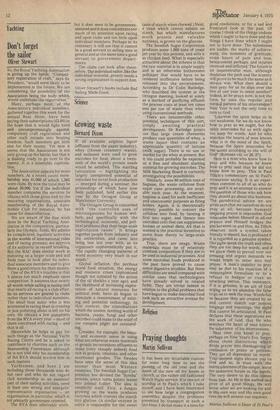Rel i gion
Praying thoughts
Martin Sullivan
It has been my invariable custom for some long time to see the passing of the old year and the dawn of the new on my knees in church, at the rather old-fashioned Watch Night service. It is one act of worship in St Paul's which I take myself, and I have been interested to see how large a congregation assembles despite the problems presented by transport at such .a late hour. I do not make it a time for good resolutions, or for a sad and frustrated look at the past. Of course I think of the things undone which I ought to have done and the things I have done which I ought not to have done. The milestones are visible, the marks of achieve ment, the moments of gratitude, some hours of pain and loss, bereavement perhaps, and injuries received and inflicted. The future is an impenetrable mist, although doubtless the path and the scenery will prove to be much the same as it always was. What then should a man pray for as he slips over .the line of one year to enter another? Indeed, as he prays now, is not the
form he uses the regular and normal pattern of his intercession? New Year is not the only time to turn to God.
"Likewise the spirit helps us in our weakness, for we do not know how to pray as we ought, but the spirit intercedes for us with sighs too keep for words. And he who searches the hearts of men knows what is in the mind of the Spirit, because the Spirit intercedes for the saints according to the will of God" (Romans viii, vv 26, 27).
Here is a man who knew how to pray and who because he knew how to pray said that he did not know how to pray. This is Paul Tillich's commentary on St Paul's mysterious saying. It is an exper
ience common to all of us who do pray and it is an attempt to answer
the question of those who ask how they should go about this business. The paradoxical advice we are given says.that we ourselves do not pray at all, because humanly speaking prayer is impossible. God intercedes before Himself in all our prayers and Himself bridges the gap between us and Him. As Tillich observes, such a symbol taken literally is'ab,surd, but is profound if it is regarded as a genuine symbol. Our sighs speak the truth and often they are too deep for words, and if
we allow them to prevail over our pressing and urgent demands we
would begin to enter into real
prayer. A man's inability to pray may be due to his rejection of a
meaningless formalism or to a refusal to badger or coax an unwilling patron. This resistance, if it is genuine, is an act of God urging us as we abandon the false to go on to seek the true. Words fail us because they are created by us and cannot match our inmost longings and yearnings, the sighs that cannot be articulated. St Paul declares that these aspirations are the work of God, that He who searches the heart of man knows the substance of his intercessions.
Next time you kneel to pray, perhaps on New Year's Eve, forget about those distinctions which divide prayer into thanksgiving or confession or praise or petition.
They are all dependent on words.
Your deepest sighs elevate you to God and so, in trust with the inarticulateness of the simple, leave
the unknown future in His hands. The very desire to do this comes from him. As He is the author and giver of all good things, He will know what we are looking for and
in His own way and His own good time He will answer our requests.
Martin Sullivan is Dean of St Paul's


























 Previous page
Previous page